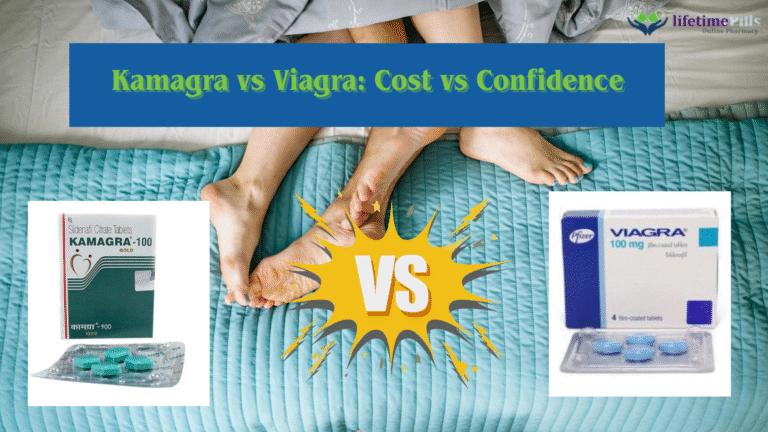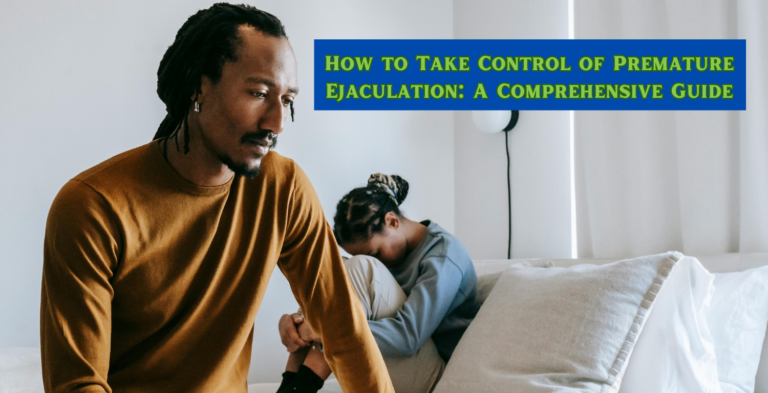Performance Anxiety and Erectile Dysfunction

In today’s fast-paced world, many men silently struggle with Performance Anxiety and Erectile Dysfunction in the bedroom.
Sex is supposed to be a natural and enjoyable experience. But for many men and women, it becomes a source of stress, pressure, and even fear. It’s a more common issue than most people think. The pressure to “perform” can be overwhelming, especially when societal expectations and personal fears come into play. Whether it’s the fear of not satisfying your partner, worrying about premature ejaculation, or not getting or maintaining an erection, performance anxiety can seriously impact a man’s sexual health. But here’s the good news: it’s manageable, and in many cases, completely treatable.
If you often worry about how you’ll perform in bed or feel anxious before sex, you might be dealing with performance anxiety—and you’re not alone. Performance anxiety affects people of all ages, and it can deeply impact your confidence, relationships, and overall sexual health.
In this blog, we will break down what performance anxiety is, why it happens, how it affects your sex life, and most importantly, what you can do to overcome it. So, if you’ve been asking yourself, “Why can’t I perform in bed?” or “Is my anxiety killing my sex drive?” – this is for you.
What is Performance Anxiety?
Performance anxiety is one of the leading psychological causes of erectile dysfunction (ED) in men. It can also cause low sex drive, difficulty reaching orgasm, and emotional distance in relationships. For women, it may lead to difficulty with arousal, lack of lubrication, or pain during sex. In both men and women, the cycle of fear and disappointment can make things worse over time.
When a person starts overthinking their performance, the body reacts by releasing stress hormones like cortisol and adrenaline, which can directly interfere with the physical response needed for sexual arousal and erection. This can contribute to erectile dysfunction (ED), low libido, and reduced intimacy with your partner.
Unlike physical issues that affect sexual function, performance anxiety is rooted in the mind. However, the body and mind are closely connected. When your brain is full of fear, it sends stress signals to the body, making it difficult for you to relax and enjoy the moment. This can interfere with arousal, blood flow, and even hormone levels, directly hurting your ability to perform.
Performance anxiety is a type of stress or fear that happens when you’re under pressure to perform well—especially during sexual activity. Instead of being relaxed and in the moment, your mind becomes filled with worries like:
“Will I last long enough?”
“What if I can’t get hard?”
“Will my partner be satisfied?”
“What if I embarrass myself?”
These anxious thoughts can interfere with your ability to become aroused, maintain an erection, or even enjoy intimacy. It turns sex into a task that must be “perfect,” instead of a pleasurable connection with your partner.
In fact, many men experiencing erectile dysfunction due to psychological reasons often find that stress and anxiety are the root causes. The problem isn’t just physical—it’s mental. And when anxiety becomes a regular guest in your bedroom, your sex life may begin to suffer significantly.
How Does Performance Anxiety Start?
Performance anxiety doesn’t just appear out of nowhere. It usually builds up slowly over time, triggered by experiences, thoughts, and social pressures.
There are many possible triggers for performance anxiety. Understanding what’s behind it can help you find the right solution. Some common causes include:
1. Fear of Failure
The biggest root cause of performance anxiety is the fear of failure. Society places a lot of expectations on sexual performance, especially for men. If you’re constantly worried about not meeting those expectations, it becomes hard to relax. The more pressure you feel, the more your body works against you. Many people worry about what their partner might think. Will they judge your body? Will they be disappointed? This constant need for approval can increase pressure and kill the mood.
2. Bad Sexual Experiences
One bad sexual encounter—like losing an erection, finishing too quickly, or disappointing your partner—can leave a lasting impact. The next time you’re intimate, you may feel nervous about repeating the mistake, which creates a loop of stress.
If you’ve had an embarrassing moment during sex in the past, it can stick with you. These memories often create a fear of repeating the same mistake.
3. Porn and Unrealistic Standards
Watching pornography frequently can set up impossible standards. You may start to think sex has to be like what you see in adult films—long-lasting, hard every time, with perfect bodies and nonstop excitement. These expectations are far from reality and can cause anxiety if you feel you don’t “measure up.”
4. Low Self-Confidence or Body Image Issues
If you’re not comfortable with your body or how you look naked, you may feel insecure during sex. This distraction can pull your attention away from pleasure and increase self-consciousness.
5. Relationship Tension
If you’re not emotionally close to your partner or there’s unresolved tension, sex can feel mechanical or forced. Emotional disconnection leads to physical disconnection, and the stress around intimacy starts to grow. Unresolved conflicts or poor communication with your partner can create distance. If the emotional connection is weak, performance anxiety often steps in.
6. Stress and Mental Health Issues
General anxiety, depression, or even work stress can spill over into your bedroom. When your mind is distracted or overwhelmed, sexual performance usually suffers.
Symptoms of Sexual Performance Anxiety
It’s not always easy to recognize that you’re dealing with performance anxiety, especially since many symptoms can seem unrelated at first.
You may not always recognize that anxiety is behind your sexual struggles. Here are some signs to watch out for:
- Difficulty getting or maintaining an erection
- Premature ejaculation or delayed ejaculation
- Avoiding sex out of fear of “failing”
- Feeling tense or distracted during intimacy
- Obsessing over your performance or comparing yourself to others
- Low self-esteem or body image issues
- Loss of sexual desire or interest in intimacy
- Sweating, rapid heartbeat, or physical tension during sexual activity
If these symptoms occur repeatedly, it may be time to address the issue and consider seeking help.
How Performance Anxiety Affects Erections and Libido
For men, performance anxiety is one of the leading causes of erectile dysfunction (ED). When you’re nervous or under pressure, your brain releases stress hormones like adrenaline and cortisol. These hormones constrict blood vessels, making it hard for blood to flow into the penis – which is essential for an erection.
The fear of not getting hard or staying hard enough can quickly become a cycle. You start worrying before intimacy, which leads to ED. Then the ED increases your anxiety, making it even harder next time. This loop continues unless you break it with the right steps.
Performance anxiety can also cause low sex drive (libido). When you associate sex with stress and failure, your desire naturally drops. The body resists what the mind fears.
How Performance Anxiety Affects Your Relationship
When sexual problems like erectile dysfunction from performance anxiety occur, it doesn’t just affect one person, it affects the relationship as a whole. Communication may break down, partners may feel rejected or unwanted, and intimacy may fade over time. The longer the issue continues, the more difficult it can become to reconnect on a physical and emotional level. Many couples end up drifting apart simply because the anxiety around sex is left unaddressed.
Moreover, performance anxiety in men can lead to avoidance of sexual encounters altogether, leading to frustration and loneliness. The fear of failure becomes so strong that it overpowers desire. Over time, this creates a vicious cycle where anxiety leads to failure, which then leads to more anxiety.
The Connection Between Anxiety and Erectile Dysfunction
One of the most common effects of performance anxiety in men is erectile dysfunction (ED). Here’s how it works:
When you’re feeling relaxed and confident, your brain sends signals to your body to allow blood to flow to the penis, causing an erection. But when you’re anxious, your brain activates the “fight or flight” response, releasing stress hormones like adrenaline and cortisol. These hormones restrict blood flow and reduce your body’s ability to relax, making it hard to get or maintain an erection.
In simple words: your brain is too busy worrying to let your body respond naturally.
This is why many men with anxiety can get an erection when alone or watching porn but struggle during actual sex.
Performance Anxiety in Women
Though it’s more often talked about in men, performance anxiety also affects women. They may not struggle with erections, but they deal with stress about:
- Their body image
- Whether they’ll orgasm
- If their partner is satisfied
- Feeling judged or insecure
- Pain or discomfort during sex
This can lead to vaginal dryness, low libido, or even conditions like vaginismus, where anxiety causes the vaginal muscles to tighten painfully. Like men, women also get stuck in cycles of fear and avoidance.
How to Overcome Sexual Performance Anxiety
The good news is that performance anxiety is highly treatable. Here are real, proven steps you can take to bring back confidence and pleasure into your sex life.
1. Talk to Your Partner
Talk honestly about your feelings and fears. A supportive partner can make a huge difference. Being vulnerable can help build intimacy and reduce pressure.
Open communication can heal more than you expect. Let your partner know how you feel. Most people are more understanding than you think, and sharing your worries can remove the pressure.
2. Change the Focus
Instead of aiming for a “perfect performance,” focus on intimacy, connection, and mutual pleasure. Try to enjoy the experience without stressing over results. Take the pressure off yourself.
3. Use Mindfulness and Deep Breathing
Try simple breathing, meditation, or yoga exercises before sex to calm your nervous system. Being present in the moment helps reduce anxiety and increases arousal. Mindfulness helps you stay in the present and lowers stress levels before and during sex.
4. Cut Down on Porn
If porn is creating false expectations or making you anxious, consider limiting your exposure. Replace it with real, intimate experiences and touch-based connection. Real sex is about pleasure and connection – not perfection.
5. Seek Professional Help
Therapists and sexologists are trained to help people deal with sexual anxiety and ED. Cognitive Behavioral Therapy (CBT) and talk therapy are both very effective for performance issues.
6. Try Medication (If Needed)
For men, ED medications like Viagra, Cialis, or Levitra can be used under medical guidance. These can help break the anxiety-ED cycle temporarily while you work on the underlying mental stress.
If anxiety is causing erectile issues, you might benefit from ED medications like Viagra, Cialis, or Levitra. But always consult a doctor before taking any medication.
When to Talk to a Doctor
If you’ve tried self-help techniques but still struggle with sexual performance anxiety, it may be time to consult a medical expert. A healthcare provider can check for any physical issues like hormonal imbalances or side effects from medications. They may also refer you to a sex therapist or mental health professional specializing in sexual anxiety and erectile dysfunction.
Ignoring the issue won’t make it go away—it may only make things worse. So, if anxiety is ruining your sex life, take that first step to address it. Seeking help isn’t a sign of weakness—it’s a move toward better health, better relationships, and a more fulfilling sex life.
Remember, seeking help is not a sign of weakness—it’s a sign of self-care and strength.
Conclusion: You’re Not Alone in This
Performance anxiety is not a rare problem—many men go through it silently. The key is not to let it define your sex life or your relationship. With the right support, mindset, and possible medical help, you can rekindle intimacy, and enjoy a healthy sex life once again. Don’t let sexual performance anxiety rob you of the pleasure and connection you deserve.
Whether it’s occasional nervousness or a long-standing issue, you can take steps to overcome it. By understanding the root cause and making simple lifestyle and mindset changes, you can regain confidence and enjoy a more fulfilling sex life.
Don’t let fear rob you of intimacy. With the right support and knowledge, you can break the anxiety cycle and bring joy back to your bedroom. It doesn’t mean there’s something wrong with you or that you’re not good in bed. It simply means that your mind is under pressure—and it’s affecting your body.
Don’t suffer in silence. Speak up, reach out, and give yourself permission to heal. You deserve a sex life that is full of pleasure, connection, and confidence.






